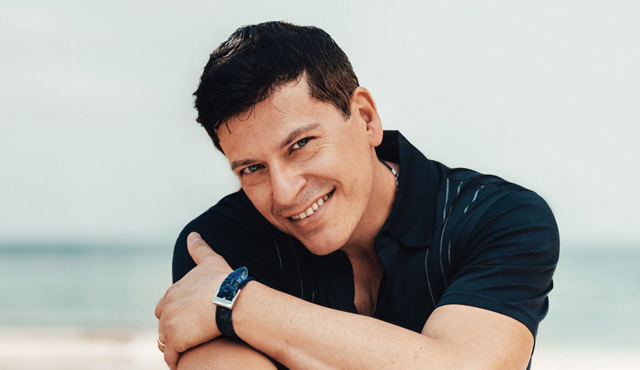Born in Austria to Neapolitan parents, Patrizio Buanne believes that Naples is more than just his ancestral home, it’s part of his cultural identity.
“Think Tom Jones, Italian-style.”
That’s how The Boston Globe described the voice and music of multilingual Neapolitan pop crooner Patrizio Buanne, who has sold more than 10 million records around the world.
In an interview with Fra Noi, Buanne described his repertoire as “original and good, old sexy ballads and fun up-tempo tunes” rooted in the pop tradition of his European upbringing and identity.
Buanne has released eight albums since his 2005 debut with “The Italian,” which reached No. 5 on the U.S. Billboard World Albums chart. He performed Feb. 18 at the Des Plaines Theatre in suburban Chicago as part of his U.S. tour to promote his latest album, “The Neapolitan,” released in October.
“Patrizio Buanne has touched his fans in a warm and musical way that truly makes everyone feel like family,” says Ron Onesti, founder of Onesti Entertainment and president of the Joint Civic Committee of Italian Americans in Chicago. “It’s been a while since he has played one of his sold-out performances in Chicago, and we are so excited to see his triumphant return!”
Taking the stage and performing live comes “as natural as washing my hands,” Buanne says, and to be able to provide positive energy to his audiences after the COVID-19 pandemic “feels like being alive again.”
His U.S. concertgoers can expect “lots of happy tears and emotions” as he performs “great songs to dance and sing along” to, including his hits and new songs from his latest album.
Buanne was born in Vienna to his Neapolitan parents, Franco and Alina Buanne, who owned a restaurant in the Austrian capital. He spent his childhood between Naples and Vienna.
“These cities shaped my upbringing and personality, musically,” Buanne explains. “Viennese sophistication and Neapolitan temperament are the ground zero of my musical journey.”
Buanne considers himself Austro-Neapolitan, and is an avid fan of the Napoli soccer club, which last year won its third-ever Italian Serie A championship, or scudetto.
Calling himself Italian “would be a way of limiting my persona and upbringing to just the geographic definition of Italy, while being Neapolitan is so much more,” he says. “In my case, it is part of my cultural identity.”
Buanne says he developed a passion for music and languages at an early age, eventually studying Romance and Slavic languages. He is fluent in Italian, Neapolitan, German, English, French, Spanish and Polish.
“Languages for me are like music to my ear and soul,” he says. “Languages are not just part of communication, but a way to open your mind on so many levels.”
His love for music comes from listening to the songs his parents played in the car, at home and in their restaurant. He started performing at a young age, winning several talent competitions starting at age 11, then formed a ’50s rock ’n’ roll band and eventually set off on a solo career. At age 17, he performed a song in Italian and Polish on the occasion of the Pope’s visit to Wroclaw, Poland, which led to his first recording, “Angelo di Dio,” in 1997.
After graduating high school in Vienna, Buanne moved to Naples and later Rome, where he attended college to study languages while looking for opportunities in the entertainment industry, such as performing on Italian TV shows.
His first albums shined a spotlight on the many American songs that are well-known internationally and have their origins in Neapolitan and Italian tunes.
Buanne points to Elvis Presley’s “It’s Now or Never” and “Surrender,” which are based on “’O sole mio” and “Torna a Surriento.” He also notes that Dusty Springfield’s “You Don’t Have to Say You Love Me” and Engelbert Humperdinck’s “A Man Without Love” are based on “Io che non vivo” and “Quando m’innamoro,” respectively.
“The list goes on,” he adds. “For the last 18 years, I have been busy touring internationally and recording all these beautiful songs in order to keep a certain genre alive through my style and voice. Now, I am still performing them, but producing and writing more and more new material with a modern twist to it.”
Among all the melodies he’s recorded, “Il mondo,” on his debut album, holds special significance for Buanne. The 1965 song was co-written and originally performed by the Italian singer, actor and songwriter Jimmy Fontana, who told him that Buanne’s rendition was his favorite, he says.
“My version is the one that is used in karaoke bars. It is my honor and responsibility to keep sharing his song,” Buanne says. “(Fontana’s are) big shoes to fill, but I don’t think about this, as it makes me otherwise nervous.”
Buanne says he’s grateful for having been able to make a living out of music for nearly 35 years, and is now “busier than ever.”
“Acts come and go and songs come up every day … and are forgotten even quicker. People don’t remember new singers anymore. In my case it seems to be different, and I am grateful,” he says. “I am not much into social media or care about being an influencer, so it must be the respect and love I have earned.”
It’s been sad to see how much the music industry has changed over time, with the emergence of streaming all but eclipsing CDs, Buanne says.
“The great capitals of showbiz, such as New York, Los Angeles or Las Vegas, are gone,” he says. “What is supposed to happen to all these great performers or musicians that are replaced by DJs or artificial intelligence? Are theaters or cinemas going to be next to close down? Are we going to be trapped at home in front of our computers, phones or TV screens, instead of experiencing ‘real life’? We need to stay human and create emotions and feelings, which a machine can’t do. People will forget what they heard or what they saw, but not how somebody made them feel.”
Buanne says he’s always been determined to stay true to himself, and is “serene and calm when it comes to my place in this industry.”
“I am not as classical as a lyrical singer, such as Luciano Pavarotti or Andrea Bocelli, but not as ‘poppy’ as Eros Ramazzotti, Zucchero or any of those kids that totally changed the musical landscape that Italy was once known for,” he says. “I am just Patrizio, and it is motivating to know that my recordings are played in every ristorante or pizzeria across the globe.”
His only plan for the future is to remain inspired by life and people, and continue being the best father and husband he can be, Buanne says.
“Life is a mystery. People make plans and God laughs. Let’s see what happens next and let’s enjoy what we have.”
The above appears in the January 2024 issue of the print version of Fra Noi. Our gorgeous, monthly magazine contains a veritable feast of news and views, profiles and features, entertainment and culture. To subscribe, click here.
 Fra Noi Embrace Your Inner Italian
Fra Noi Embrace Your Inner Italian








My husband and I have enjoyed listening to Patrizio for many years. I don’t remember where we first saw him. It might have been on a television show, but my husband purchased his CD a good 20 years ago and I still play it today in my car and I love listening to his music.